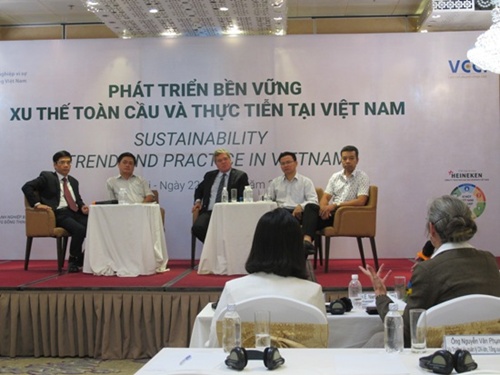Sustainable development – an inevitable business trend
 |
| Sustainable development is an inevitable trend and is increasingly popular in the business community, both globally and in Viet Nam. - Photo baodansinh.vn |
The conference, designed to support businesses in Việt Nam and provide information on latest trends and topics related to sustainable development, as well as to create a forum for discussion and sharing experiences about current business practices, along with solutions for creating sustainable businesses.
At the conference, speakers discussed sustainable development as being an inevitable trend of the times, therefore, implementation of sustainable development will create many opportunities for businesses to enhance their reputation and competitiveness, as well as attract human resources, investors and shareholders.
With sustainable development, enterprises have to improve their productivity and reduce costs by making use of, and preserving, natural resources, enhancing employee's productivity and raising the competitiveness of enterprises, as well as creating favorable conditions for businesses in the process of international economic integration.
Speaking at the conference, Khương, who is also president of the Vietnam Business Council for Sustainable Development (VBCSD), said in implementing sustainable development in the business community, VBCSD had also succeeded in promoting the participation of businesses in the implementation of sustainable development throughout the country.
Over the past 6 years, VBCSD became a bridge to link Government agencies with the business community, and helped in raising the voice of the business community, in the process of developing and implementing policies and programmes related to sustainable development and improvement of competitiveness, green growth and climate change, said Khương.
Nguyễn Văn Tài, general director of the Vietnam Environment Administration, told participants that sustainable development needed the participation of the entire society, especially from non-governmental organisations and the business community.
Tài said Việt Nam was in the process of development, as were Japan, Singapore and South Korea in the 1980s. After a period of time, many investment projects started displaying problems due to environmental pollution. Therefore, Việt Nam was faced with a new turning point that requires strong measures to eliminate environmental problems and technologies that harm the environment.
Deputy Minister of Planning and Investment Nguyễn Thế Phương told participants that the best solution to eliminate problems regarding environmental pollution was that every businesses must conduct action plans by working towards a sustainable and green growth. In addition, the action plans should be deployed uniformly from the central to local levels, as well as shifting local economic structures and renovating technology. Further, Tài said it was time to reconsider foreign investment, obsolete technologies and monitor environmental assessments.
Phương also praised the role of enterprises and emphasised the importance of attracting the participation of the private economic sector, finance assistance from the Government and official developmental assistance. This will become a catalyst to attract and shape a favorable environment for the private sector to invest in the field of climate change, green growth and sustainable development. Phương noted that to achieve this goal, Vietnamese businesses needed to focus on researching and identifying an appropriate model of economic development. Additionally, Khương said it was time to build a fence of environmental protection by firmly rejecting obsolete technologies. Further, businesses that were using outdated technologies and causing environmental pollution would have to pay higher taxes.
Leo Evers, managing director of Heineken Vietnam Brewery (HVBL), also presented a review of its sustainability report 2015 on "Brewing a Better Vietnam". He said this was the second sustainability report that HVBL has released, which aims to demonstrate its long term commitment to sustainable development. The report focused on six areas: advocating responsible consumption, protecting water resources, reducing CO2 emissions, growing with communities, sourcing sustainably and promoting health and safety.
What the stars mean:
★ Poor ★ ★ Promising ★★★ Good ★★★★ Very good ★★★★★ Exceptional
Latest News
More News
- Law on Investment takes effect (March 02, 2026 | 16:21)
- Ho Chi Minh City attracts nearly $980 million in FDI in early 2026 (March 02, 2026 | 10:57)
- Businesses bouncing back after turbulent year (February 27, 2026 | 16:42)
- VinaCapital launches Vietnam's first two strategic-beta ETFs (February 26, 2026 | 09:00)
- PM sets five key tasks to accelerate sci-tech development (February 26, 2026 | 08:00)
- PM outlines new tasks for healthcare sector (February 25, 2026 | 16:00)
- Citi report finds global trade transformed by tariffs and AI (February 25, 2026 | 10:49)
- Vietnam sets ambitious dairy growth targets (February 24, 2026 | 18:00)
- Vietnam, New Zealand seek level-up in ties (February 19, 2026 | 18:06)
- Untapped potential in relations with Indonesia (February 19, 2026 | 17:56)















 Mobile Version
Mobile Version